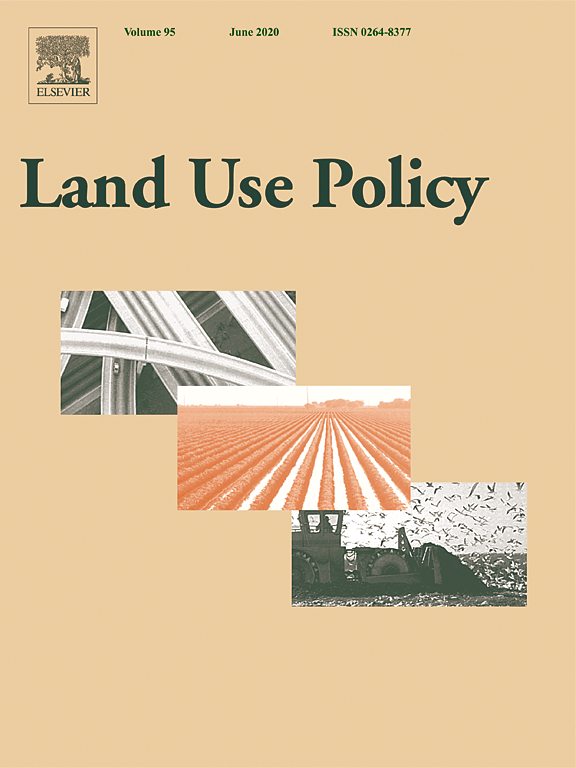Location
Land Use Policy is an international and interdisciplinary journal concerned with the social, economic, political, legal, physical and planning aspects of urban and rural land use. It provides a forum for the exchange of ideas and information from the diverse range of disciplines and interest groups which must be combined to formulate effective land use policies. The journal examines issues in geography, agriculture, forestry, irrigation, environmental conservation, housing, urban development and transport in both developed and developing countries through major refereed articles and shorter viewpoint pieces.
Land Use Policy aims to provide policy guidance to governments and planners and it is also a valuable teaching resource.
ISSN: 0264-8377
Members:
Resources
Displaying 126 - 130 of 279Effects of historical land use and land pattern changes on soil erosion – Case studies from Lower Austria and Central Bohemia
This paper addresses changes in land use and in the spatial distribution of land units and their influence on the soil erosion risk in two areas with a different geomorphology and a different historical and political development: an intensively-used lowland agricultural watershed in central Bohemia, Czech Republic, and a partially hilly agricultural and wine-producing municipality in northern Austria.
What makes decisions about urban water infrastructure forward looking? A fuzzy-set qualitative comparative analysis of investment decisions in 40 Dutch municipalities
Municipalities worldwide are confronted with the need to take long-term decisions about ageing water infrastructure in the face of unpredictable future developments. Previous studies on long-term decision making have proposed solutions targeted at the domain of either politics or planning. This study combines insights from the domains of policy, politics, and planning by using the Multiple Streams Framework to explain what enables municipalities to take forward-looking investment decisions.
Preventing young farmers from leaving the farm: Investigating the effectiveness of the young farmer payment using a behavioural approach
The number of young farmers has decreased over recent decades in several developed countries such as the United States and European countries. A recent strategy adopted by the European Union to address the resulting age imbalance is the Young Farmer Payment which provides an additional payment on top of the average basic payment introduced in the last Common Agricultural Policy reform. The objective of this study is to determine, by means of a behavioural approach, how this payment influenced the incentives of young farmers to stay in the farm.
Female labor outcomes and large-scale agricultural land investments: Macro-micro evidencefrom Tanzania
This paper examined the extent to which Large-scale Agricultural Land Investments (LALIs) has delivered on its promises (e.g. increased productivity, job creation, and rural development, particularly for rural women). We conducted empirical analyses using the Living Standards Measurement Study-Integrated Surveys on Agriculture (LSMS-ISA) dataset (macro evidence), which was complemented with two case studies of LALIs in Kilombero district, Morogoro region, Tanzania (micro evidence). The findings from the study revealed that the LALIs have limited effect on agricultural wage.
The effect of irrigation service delivery and training in agronomy on crop choice in Tajikistan
The aim of this paper is to analyze the effect of irrigation delivery services and agricultural extension services on crop choice in southern Tajikistan. This analysis is motivated by the government’s recent efforts to address the country’s severe malnutrition problem by supporting changes in irrigation service delivery and agronomy to increase diversity in agricultural production and consumption, in an environment where the cultivation of cotton had, until recently, been mandatory.



